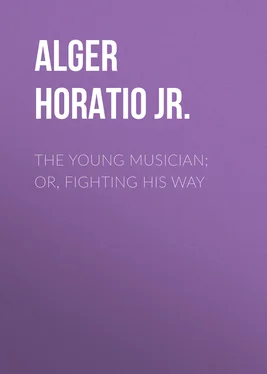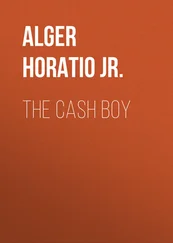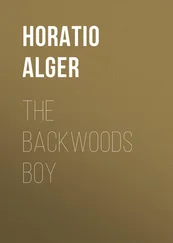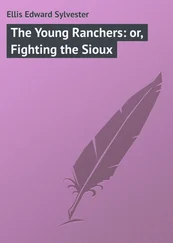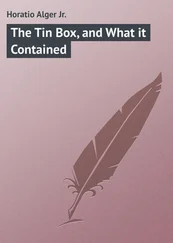Horatio Alger - The Young Musician; Or, Fighting His Way
Здесь есть возможность читать онлайн «Horatio Alger - The Young Musician; Or, Fighting His Way» — ознакомительный отрывок электронной книги совершенно бесплатно, а после прочтения отрывка купить полную версию. В некоторых случаях можно слушать аудио, скачать через торрент в формате fb2 и присутствует краткое содержание. Жанр: foreign_children, literature_19, foreign_antique, foreign_prose, на английском языке. Описание произведения, (предисловие) а так же отзывы посетителей доступны на портале библиотеки ЛибКат.
- Название:The Young Musician; Or, Fighting His Way
- Автор:
- Жанр:
- Год:неизвестен
- ISBN:нет данных
- Рейтинг книги:5 / 5. Голосов: 1
-
Избранное:Добавить в избранное
- Отзывы:
-
Ваша оценка:
- 100
- 1
- 2
- 3
- 4
- 5
The Young Musician; Or, Fighting His Way: краткое содержание, описание и аннотация
Предлагаем к чтению аннотацию, описание, краткое содержание или предисловие (зависит от того, что написал сам автор книги «The Young Musician; Or, Fighting His Way»). Если вы не нашли необходимую информацию о книге — напишите в комментариях, мы постараемся отыскать её.
The Young Musician; Or, Fighting His Way — читать онлайн ознакомительный отрывок
Ниже представлен текст книги, разбитый по страницам. Система сохранения места последней прочитанной страницы, позволяет с удобством читать онлайн бесплатно книгу «The Young Musician; Or, Fighting His Way», без необходимости каждый раз заново искать на чём Вы остановились. Поставьте закладку, и сможете в любой момент перейти на страницу, на которой закончили чтение.
Интервал:
Закладка:
Such officials as he have much to answer for, and yet there are plenty just as false to their responsibilities as he.
It was two days after Squire Pope’s ineffectual attempt to possess himself of Philip’s violin, that our hero was walking along a country road, on his return from an errand which, he had undertaken for his friend’s father, when his attention was drawn to the yelping of a small dog, that seemed in fear or pain.
Looking over the stone wall, Philip saw Zeke Tucker amusing himself by thrusting the dog’s head into a pool of dirty water, and holding it there till the animal was nearly strangled. The dog’s suffering appeared to yield the most exquisite amusement to the boy, who burst into peal after peal of rude laughter as he watched the struggles of his victim.
Philip, like every decent boy, had a horror of cruelty, and the sight stirred him to immediate anger and disgust.
“What are you doing there, Zeke Tucker?” he demanded sternly.
“None of your business!” answered Zeke, frowning.
“You’d better answer my question,” said Philip, who had by this time jumped over the wall.
“Then I will. I’m havin’ a little fun. What have you got to say about it?” retorted Zeke.
And once more he plunged the head of the poor dog into the filthy pool.
The next moment he found himself floundering on his back, while the dog, slipping from his grasp, was running across the meadows. “What did you do that for!” demanded Zeke, springing up, his face flaming with rage.
“I rather think you understand well enough,” answered Philip contemptuously.
“What business have you to touch me? I can have you arrested, you low pauper!”
“What’s that? What did you call me?” demanded Philip.
“I called you a pauper.”
“By what right?”
“Squire Pope told my father he was going to bring you over to the poorhouse to live. You just see if my father doesn’t give it to you then!”
“Thank you,” said Phil contemptuously; “but I don’t propose to board at your establishment, not even to obtain the pleasure of your society.”
“Maybe you can’t help yourself,” said Zeke gleefully.
For he saw what had escaped the notice of Philip, whose back was turned—namely, a four-seated carryall, containing his father and Squire Pope, which had just halted in the road, hard by.
“Mr. Tucker,” said Squire Pope, in a low tone, “now will be the best opportunity to capture the boy and carry him to the almshouse.”
“All right—I’m ready,” said Tucker readily.
For another boarder would bring him sixty cents a week more.
They stopped the horses and prepared for business.
CHAPTER XIII. IN THE ENEMY’S HANDS
Philip heard a step, and turned to see whose it was; but, when he recognized Mr. Tucker, the latter’s hand was already on his collar.
“What have you been doin’ to Zeke? Tell me that, you young rascal,” said Mr. Tucker roughly.
“He pitched into me savage, father,” answered Zeke, who had picked himself up, and was now engaged in brushing the dust from his coat.
“Pitched into ye, did he?” repeated Joe Tucker grimly. “I reckon he didn’t know your father was ‘round. What have you got to say for yourself, eh?”
Philip regarded his captor contemptuously, and didn’t struggle to escape, knowing that he was not a match for a man five inches taller than himself. But contempt he could not help showing, for he knew very well that Zeke had inherited his mean traits largely from his father.
“I’ll thank you to remove your hand from my collar, sir,” said Philip. “When you have done that, I will explain why I pitched into Zeke, as he calls it.”
“Don’t you let go, father!” said Zeke hastily. “He’ll run away, if you do.”
“If I do, you can catch me between you,” returned Philip coolly.
“I reckon that’s so,” said Mr. Tucker, withdrawing his hand, but keeping wary watch of our hero.
“Now go ahead!” said he.
Philip did so.
“I saw Zeke torturing a small dog,” he explained, “and I couldn’t stand by and let it go on.”
“What was he doin’ to him?” inquired Mr. Tucker.
“Putting the poor animal’s head into this dirty pool, and keeping it there till it was nearly suffocated.”
“Was you doin’ that, Zeke?” asked his father.
“I was havin’ a little fun with him,” said Zeke candidly.
“It might have been fun to you, but it wasn’t to him,” said Phil.
“Why didn’t you ask Zeke to stop, and not fly at him like a tiger?” demanded Mr. Tucker.
“I did remonstrate with him, but he only laughed, and did it again.”
“He hadn’t no right to order me,” said Zeke. “It wa’n’t no business of his if I was havin’ a little fun with the dog.”
“And I had a little fun with, you,” returned Philip—“You couldn’t have complained if I had dipped your head in the water also.”
“I ain’t a dog!” said Zeke.
“I should respect you more if you were,” said Philip.
“Are you goin’ to let him talk to me like that!” asked Zeke, appealing to his father.
“No, I ain’t,” said Mr. Tucker angrily. “You’ve committed an assault and battery on my son, you rascal, and you’ll find there ain’t no fun in it for you. I could have you arrested and put in jail, couldn’t I, squire?”
“Ahem! Well, you could have him fined; but, as he is to be under your care, Mr. Tucker, you will have a chance of making him conduct himself properly.”
“What do you mean by that, Squire Pope?” asked Philip quickly.
“Young man, I do not choose to be catechized,” said Squire Pope, in a dignified manner; “but I have no objections to tell you that I have made arrangements with Mr. Tucker to take you into the poorhouse.”
“I’ve heard that before, but I couldn’t believe it,” said Philip proudly.
“I guess you’ll have to believe it pretty soon, he, he!” laughed Zeke, with a grin which indicated his high delight. “I guess dad’ll make you stand round when he gits you into the poor-house.”
“Don’t you consider me capable of earning my own living, Squire Pope?” asked Philip.
“Ahem! Yes, you will be one of these days. You won’t have to stay in the almshouse all your life.”
“You’ll have a chance to earn your livin’ with me.” said Mr. Tucker. “I shall give you something to do, you may depend.”
“You can make him saw and split wood, father, and do the chores and milk the cow,” suggested Zeke.
“I have no objection to doing any of those things for a farmer,” said Philip, “but I am not willing to do it where I shall be considered a pauper.”
“Kinder uppish!” suggested Mr. Tucker, turning to Squire Pope. “Most all of them paupers is proud; but it’s pride in the wrong place, I reckon.”
“If it is pride to want to earn an independent living, and not live on charity, then I am proud,” continued Philip.
“Well, squire, how is it to be,” asked Mr. Tucker.
“Philip,” said Squire Pope pompously, “you are very young, and you don’t know what is best for you. We do, and you must submit. Mr. Tucker, take him and put him in the wagon, and we’ll drive over to the poorhouse.”
“What! now?” asked Philip, in dismay.
“Just so,” answered Joe Tucker. “When you’ve got your bird, don’t let him go, that’s what I say.”
“That’s the talk, dad!” said Zeke gladfully. “We’ll take down his pride, I guess, when we’ve got him home.”
Joe Tucker approached Philip, and was about to lay hold of him, when our hero started back.
“You needn’t lay hold of me, Mr. Tucker,” he said. “I will get into the wagon if Squire Pope insists upon it.”
Читать дальшеИнтервал:
Закладка:
Похожие книги на «The Young Musician; Or, Fighting His Way»
Представляем Вашему вниманию похожие книги на «The Young Musician; Or, Fighting His Way» списком для выбора. Мы отобрали схожую по названию и смыслу литературу в надежде предоставить читателям больше вариантов отыскать новые, интересные, ещё непрочитанные произведения.
Обсуждение, отзывы о книге «The Young Musician; Or, Fighting His Way» и просто собственные мнения читателей. Оставьте ваши комментарии, напишите, что Вы думаете о произведении, его смысле или главных героях. Укажите что конкретно понравилось, а что нет, и почему Вы так считаете.
